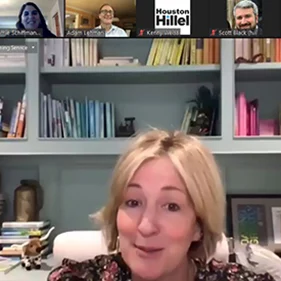‘Awkward, brave and kind’

Brené Brown, a social scientist and research professor at the University of Houston Graduate School of Social Work, was standing in a room full of U.S. Special Forces members on Oct. 24, 2016 at Fort Bragg, North Carolina. Brown had just challenged her audience to think of an example of courage that didn’t require vulnerability.
They fell silent.
Finally, one soldier stood up and said, “Three tours. There is no courage without vulnerability.”
A few years after this lecture, this man’s words still stand out to Brown because they echo one of the prime findings of her research: Vulnerability is the most accurate measure of courage.
More than 380 students, Hillel professionals and Jewish educators outside of Hillel participated in a virtual conversation about collective vulnerability with Brené Brown and Hillel International CEO Adam Lehman. The Zoom event, hosted by Hillel@Home on May 5, explored the hidden power in vulnerability, a feeling all too familiar for many during the coronavirus pandemic.
Their conversation examined the differences in experiencing grief and fear individually versus collectively. Brown explained how a national trauma causes some people to default into fear and become their worst selves. For others, it inspires elevated kindness and thoughtfulness in others.
She said a major concern with rampant fear and pain is that it leads to comparative suffering.
“It’s a dangerous idea based on the theory that empathy is finite,” Brown said. “Everyone’s grief is real and everyone can have that grief.”
When people feel ashamed for grieving, they are focused solely on internalizing their own emotions and are unable to be empathetic toward others, Brown added.
Brown started her research on empathy, shame and grief just a few months before the Sept. 11 attack on the World Trade Center, giving her a very immediate perspective into the expression of these emotions.
“Unacknowledged trauma manifests itself in really scary ways,” Brown said, urging attendees to fully process their feelings of anxiety and fear. “Hurt people hurt people.”
Lehman continued the discussion by asking how people, especially students, can be courageous if they are not willing to fail. Brown described how a major fallacy of college-age thinking is that once students become adults, they will no longer be vulnerable and uncertain.
“Grown-ups are just winging it,” Brown said. “You need to get out there and try things that are ridiculous and don’t make sense, and I think you should fall down and get back up with bruised hearts and scraped knees and then try again.”
Success requires vulnerability, the act of putting oneself out there without being able to guarantee the outcome. Brown and Lehman both agreed that students should be focused on separating their self-worth from their work, rather than trying to avoid failure altogether.
“When you fall, you don’t suck, that sucked,” Brown said.
The discussion concluded with Brown offering up some much-appreciated advice, both to students and “grown-ups” alike.
“Own who you are, own it all, and find a way to love yourself through that process because if you can do that, you can do anything,” Brown said. “Learn how to be in vulnerability and uncertainty because that is where your power is.”
As for life during the pandemic, Brown suggested using self-care to reduce stress and anxiety and prepare oneself to offer empathy to others.
“We don’t need you today and tomorrow, we need you for the long haul,” Brown said. “I used to say ‘courage over comfort,’ but what I’m choosing now is ‘awkward, brave and kind.’ If we could be braver and kinder and more real, that would be the plus side of this.”
Story written by Dionna Dash.